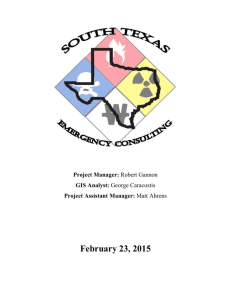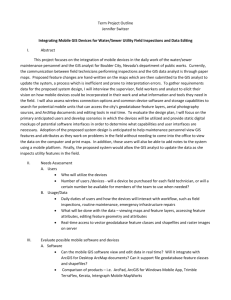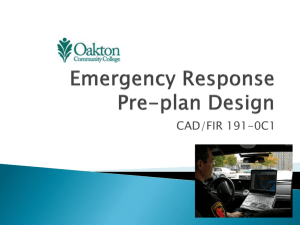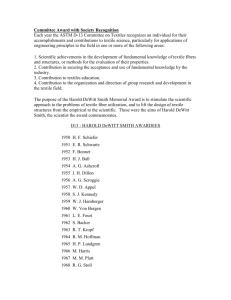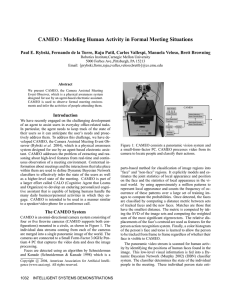Project Proposal Presentation
advertisement
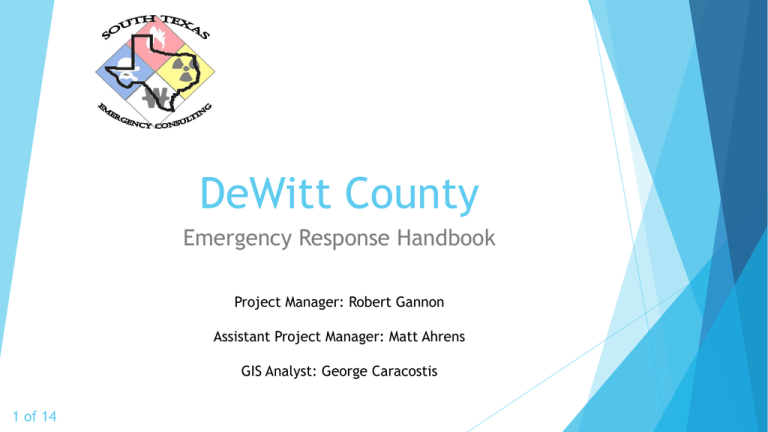
DeWitt County Emergency Response Handbook Project Manager: Robert Gannon Assistant Project Manager: Matt Ahrens GIS Analyst: George Caracostis 1 of 14 Introduction DeWitt County is a small, rural county in South Texas Northwest of Victoria, TX 4 major cities (Cuero, Westhoff, Yoakum and Yorktown) 2 of 14 Est. Population of 20,503 people (2013) Only 7 volunteer fire departments / 910 Sq. miles Introduction Continued… The Problem: Increase in chemical fires Concerns of fires, spills, and emissions from chemical-holding facilities Lack of access to internet, maps, emergency contacts (Emrich et al, 2011). Difficulty of communication between emergency response agencies Response protocol and assignment needed for chemical hazard emergencies (Cova, 1999) 3 of 14 Introduction Continued.. The Solution: Compose a hand held guidebook to distributed to all emergency response teams in DeWitt County. The handbook will contain: Information on facility with Extremely Hazardous Substance (EHS) material and hydrocarbons (H2S). Map for each EHS/H2S chemical-holding facility containing: 4 of 14 Calculated safe zones for roadblocks Facility gate access points Highlighted road route from closest fire department to facility List of contacts, notification procedures List of all H2S and other hazardous materials on site Protective actions to be taken Data Materials & Analysis Data obtained from client includes: DeWitt County Tier II and EMS/FD/School data provided by Texas Department of Sate Health Services. Street Addresses, decimal degree coordinates of chemical facilities Chemical inventory at facilities Facility contact information Texas State Data Center website Shape files for DeWitt County: city boundaries, roads, rivers, lakes United States Census Bureau Topologically Integrated Geographic Encoding and Referencing (TIGER) files for road networks, geocoding, address matching – used by US Census Bureau to describe land attributes We used them to confirm facility locations, gate access and optimum roadblock placement 5 of 14 Analysis Continued… Software Used: Cameo Software Suite: Cameo FM, Cameo Chemicals, Aloha and Marplot Microsoft Excel – Tier II database information Aloha for threat analysis ArcGIS 10.2 for final maps and analysis 6 of 14 Methodology Install Cameo Suite View, organize, edit Tier II database Research chemical properties and hazards Create an ArcMap document: -Include all base shape files Cameo FM Database 7 of 14 -Locate facilities in ArcMap Methodology Continued… Cameo Export Tier II Database: Join Database files to facilities layer Excel Join Layer Layer Join Field Table Join Field Excel Table File Facilities.shp FacilityRecordID FacilityRecordID ChemicalsInInv.csv FacilityRecordID ChemicalInvLocations.cs v FacilityRecordID ChemInvMixtures.csv OtherRecordID Facilities.shp ContactRecordID ContactRecordID ArcMap ContactsLink.csv Contacts.csv Series of joins will furnish each mapped facility with necessary chemical and contact information Create Map for each facility with a threat zone radius, contact information, and emergency protocol (roadblocks, route, gate access) 8 of 14 Expected Results & Findings By the end of the project, we want to have a fully functioning handbook mapping Each of the EHS/H2S chemical facilities including Threat zones in and around the facility Roadblock locations Gate access points Contact information for each facility List of all hospitals, schools, public/private buildings around facility Have least cost path for emergency responders Chemical inventory Protocol listed in a table next to each map Information on Classification levels (Alerts, Site Area, General Emergency) Classification Reporting script for Agencies calling in 911 Dispatch 9 of 14 Project Completion Timeline Timeline Week 1 Week 2 Week 3 Week 4 Week 5 Week 6 Week 7 Week 8 Week 9 Week 10 Week 11 Week 12 Week 13 Week 14 2-Feb Client Presentation/ First Client Visit Proposal Preparation Proposal Presentation/ Second Client Visit Data Collection Analysis Progress Report Presentation/ Third Visit Final Project Preparations Project Presentation 10 of 14 9-Feb 16-Feb 23-Feb 2-Mar 9-Mar 16-Mar 23-Mar 30-Mar 6-Apr 13-Apr 20-Apr 27-Apr 4-May Budget Data Collection and Analysis Weeks Hours Pay/Hr. Total 1-6 Collection (4 hours a week * 6 weeks * 2 consultants) 48 $30.00 $1,440.00 4-10 Analysis ( 10 hours a week * 6 weeks * 2 consultants) 120 $55.00 $6,600.00 Total Cost = $8,040.00 Project Management Weeks Hours Pay/Hr. Total 4-10 GIS Analyst (15 hours a week * 6 weeks) 90 $36.00 $3,240.00 2-12 Assistant Manager (15 hours a week * 10 weeks) 150 $55.00 $8,250.00 2-12 Project Manager (10 hours a week * 10 weeks) 100 $75.00 $7,500.00 Total Cost = $18,990.00 Software Licenses Usage Total ArcGIS($1,500 annual Std. User License) $1,500/12 * 3 months of use $375.00 Adobe Creative Cloud ( $599.88 annual cost) $599.99/12 * 3 months of use $149.97 Total Cost = 11 of 14 $524.97 Total Project Cost= $27,554.97 Final Deliverables CD Containing: Excel spreadsheets of facility and contact data ArcMap document PDF file of completed Chemical Release Guide PowerPoint presentation Shape files Metadata Hardcopies of completed Chemical Release Guide 12 of 14 Conclusion & Discussion The goal of this project is to help keep the facilities, their contents, and the community safe We want to help the first responders do their job to the best of their abilities These maps and deliverables that we are creating are meant to help save lives throughout the community In a small community there are not as many resources available which is why we can make a difference Please ask any questions you may have 13 of 14 References Cova, T. J. (1999). GIS in emergency management. Geographical information systems, 2, 845-858. DeWitt County Profile. (2013). Retrieved February 18, 2015, from http://www.txcip.org/tac/census/profile.php?FIPS=48123 Emrich, C. T., Cutter, S. L., & Weschler, P. J. (2011). GIS and emergency management. The SAGE Handbook of GIS and Society. London, Sage, 321-43 Eagle Ford Shale - Overview, News, Companies, Geology, & More. (n.d.). Retrieved February 18, 2015, from http://eaglefordshale.com/ 14 of 14
